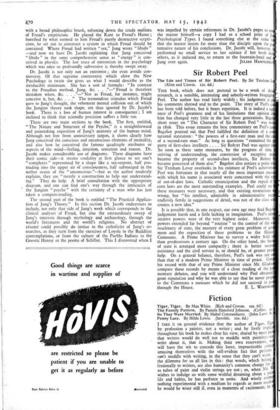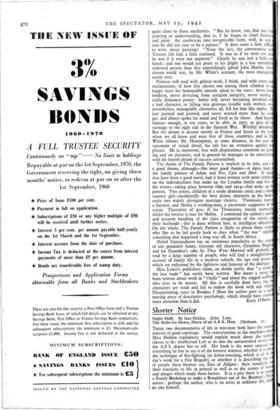Fiction
I TAKE it on general evidence that the author of Tiger, rig by profession a painter, not .a writer ; and by lively imPli throughout his book he makes clear his view, shared by most pa that writers would do well not to meddle with painting—n write about it, that is. Making their own reservations, .% will have the wit to concede this loose, impracticable pry amusing themselves with the self-evident fact that painters can't meddle with writing, in the sense that they can't write. the dilemma for us all lies in this: that words, which belong fessionally to writers, are also humanity's common change for as tubes of paint and violin strings are not ; so, when Mr. wishes to indulge us with some wishful dreaming about a pa life and habits, he has perforce to write. And wisely attem nothing experimental with a medium he regards as mere meth he would be wiser still if, even in moments of excitement, he quite close to those mechanics. " But he knew, too, that any ti painting or understanding, that is, if he began to chart humani and paint the unobvious into recognisable form, well, in such case he did not care to be a painter." It does seem a little diffic to write about painting! " None the less, the conversation wi Trevors left him a little confused. It was as if he were not wh he was if it were not apparent." Clearly he was just a little co fused ; and one would not point to his plight in a less remarkabl endowed person than this astonishingly gifted John Martin, who chosen world was, by Mr. White's account, the most manageab oyster ever.
Painters will read with gritted teeth, I think, and with some ru exclamations, of how this chosen one among them climbed in happy years his honourable smooth spiral to the stars : never los" modesty, never deviating from arrogant integrity, never earning really dishonest penny : better still, never becoming involved wi a bad character, or falling into grievous trouble with women, w nevertheless, manageable characters all, fell for him like apples. just painted and painted, and never wanted more than he co get, and always spoke his mind and lived as he chose. And beca famous enough, in ten years, to be able, in 1937, to give all h earnings to the right side in Ate Spanish War. Wishful dreaming But the dream is dreamt mostly in France and Spain in the yea when we all knew and were free of those countries, and as White follows Mr. Hemingway, at some distance, in his care f statement of visual detail, his tale has an evocative quality th pleases. He is, moreover, free with disputatious comment on pain ing and on character, and in general he manages to be entertains with his boyish dream of success untarnished.
The theme of The Family Pattern is implicit in its title, and it a good theme, although—like most good themes—it dates back t the family pattern of Adam and Eve, Cain and Abel. It mig also have been a good novel, had it been written with more empha, on the individualities that make up the Louden family and less the events—taking place between 1890 and 1914—that make up pattern. Two sisters, children of a seedy dramatic critic and a stu country girl—incidentally the best drawn character in the boo make two widely divergent marriage choices. Thomasina marri a baronet, and Melita a working-man, a passionate supporter of union. Thereafter all goes ill for Thomasina, except material whilst the reverse is true for Melita. I commend the author's card and accurate handling of the class antagonism of the sisters their husbands ' • this is done without bias, in intelligent objectivit On the whole, The Family Pattern is likely to please those reade who like to be led gently back to days when " the war " signifi something that happened a long way off, in South Africa. Mabel Constanduros has an enormous popularity as the crea of one genuinely funny, tiresome old character, Grandma Bugg and for Grandma's sake- So They Were Married will probably read by a large number of people, who will find a straightforwa account of family life in a modern suburb, the ups and downs which are enlivened by the lightness and humour of the dialogue.
Miss Lewis's publishers claim, no doubt justly, that " a novel the lace trade " has rarely been written. But many a novel h
been written about work in " " and about the rugged millh who rises to be master. All this is carefully done here, but characters are stock and fail to endow the book with any vitalit Disappointing, since in Because. I Must the author gave us a re moving piece of descriptive psychology, which should have receiv



























 Previous page
Previous page